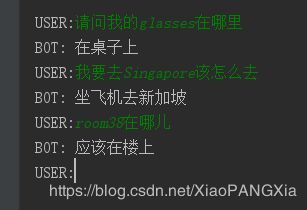aiml的中文适配aiml_cn
aiml的中文适配aiml_cn
与其每次费力迁就,不如一劳永逸改造它
源码地址: https://github.com/xiaopangxia/aiml_cn
aiml对中文的支持一直不好,主要时他对中文字符的分割处理不好。很多人选择强行给问句加空格,或者用分词策略。这种做法对纯中文有一点作用,但当问句时中英混句时依然不好用。因为Kernel.py中learn函数的实现策略是判断有英文就当全英文处理,没有英文才给你逐字符加空格,原实现如下:
def learn():
...
for key,tem in handler.categories.items():
new_key = key
if key and key[0] and key[1] and key[2] and em_ext == '.aiml' and (not self._check_contain_english(key[0])):
new_key = (' '.join(key[0]), key[1], key[2])
elif key and key[0] and key[1] and key[2] and em_ext == '.aiml' and self._check_contain_english(key[0]):
new_key=(key[0].upper(), key[1], key[2])
self._brain.add(new_key, tem)
对aiml的python库做了简单修改,更加适配中文 Adapt aiml to Chinese better。与其每次费力迁就,不如一劳永逸改造它,做了几处小修改。
1.将Kernel里原来的self._check_contain_english改成了self._check_all_english,即判断问句是否为全英文。在learn和respons函数里的三处调用也尽数改为self._check_all_english。
def _check_contain_english(self, des_str):
for uchar in des_str:
if (uchar >= u'\u0041' and uchar <= u'\u005a') or (uchar >= u'\u0061' and uchar <= u'\u007a'):
return True
else:
return False
def _check_all_english(self, des_str):
for uchar in des_str:
if (uchar >= u'\u0041' and uchar <= u'\u005a') or (uchar >= u'\u0061' and uchar <= u'\u007a'):
pass
else:
return False
return True
2.在learn函数里不管是不是全为英文都执行upper操作,转大写。
if key and key[0] and key[1] and key[2] and em_ext == '.aiml' and (not self._check_all_english(key[0])):
new_key = (' '.join(key[0]).upper(), key[1], key[2])
elif key and key[0] and key[1] and key[2] and em_ext == '.aiml' and self._check_all_english(key[0]):
new_key=(key[0].upper(), key[1], key[2])
